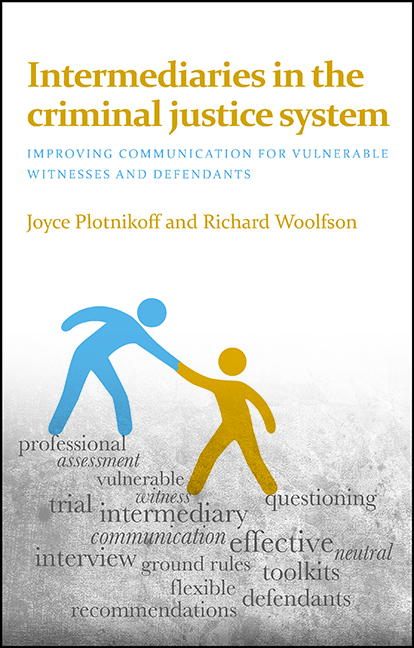 Intermediaries in the Criminal Justice System
Intermediaries in the Criminal Justice System Book contents
- Frontmatter
- Contents
- About the authors
- The Nuffield Foundation
- Acknowledgements
- Foreword
- one Introduction: a fresh pair of eyes
- two The intermediary scheme in England and Wales
- three Behind the scenes: planning to assess the witness
- four Assessment methods and involvement of the interviewer
- five Communication aids and stress reduction strategies
- six Contributing to the effectiveness of the police interview
- seven Negotiating professional space at the ground rules hearing
- eight Making the ground rules hearing effective
- nine ‘Every reasonable step’: preparation for giving evidence
- ten Cross-examination: research, case law, training and regulation
- eleven Cross-examination: intervention at trial
- twelve Cross-examination: challenges at the cutting edge
- thirteen The uneasy position of vulnerable defendants
- fourteen A new profession
- fifteen Conclusion
- References
- Index
- Table of cases
- Legislation
- Rules
- Practice directions
five - Communication aids and stress reduction strategies
Published online by Cambridge University Press: 08 March 2022
- Frontmatter
- Contents
- About the authors
- The Nuffield Foundation
- Acknowledgements
- Foreword
- one Introduction: a fresh pair of eyes
- two The intermediary scheme in England and Wales
- three Behind the scenes: planning to assess the witness
- four Assessment methods and involvement of the interviewer
- five Communication aids and stress reduction strategies
- six Contributing to the effectiveness of the police interview
- seven Negotiating professional space at the ground rules hearing
- eight Making the ground rules hearing effective
- nine ‘Every reasonable step’: preparation for giving evidence
- ten Cross-examination: research, case law, training and regulation
- eleven Cross-examination: intervention at trial
- twelve Cross-examination: challenges at the cutting edge
- thirteen The uneasy position of vulnerable defendants
- fourteen A new profession
- fifteen Conclusion
- References
- Index
- Table of cases
- Legislation
- Rules
- Practice directions
Summary
The justice system has improved physical accessibility, for example through providing ramps for wheelchairs in court buildings, but it still has much to learn about communication ‘ramps’ – visual tools like pictures, symbols and figures to support communication (see, for example, Schalling, 2009). While few people rely on ‘augmentative and alternative communication’ in their daily lives, many in the justice system can benefit from aids to improve the quality and effectiveness of communication, reduce challenging behaviour and increase assertiveness (Communication Matters, 2013). Visual aids are less taxing to auditory working memory and provide concrete reminders to those with limited understanding of spoken language.
Section 30 of the Youth Justice and Criminal Evidence Act 1999 enables a vulnerable witness to be ‘provided with such device as the court considers appropriate with a view to enable questions or answers to be communicated’ (see also Ministry of Justice, 2011a, paras 3.103–122; and Judicial College, 2013, chapter 5, para 53). This is a separate special measure from the section 29 intermediary provision; in practice, applications for communication aids seem to be confined to cases in which intermediaries are appointed.
This chapter describes a range of aids and the way they are used. These include aids to reinforce ‘rules’ when being questioned, such as ‘Don’t guess’, as well as stress reduction strategies. Being questioned in the police interview or at court inevitably heightens anxiety, sometimes to the point where the witness is unable to continue. Stress is likely to impair accurate communication. Vulnerable witnesses with access to visual tools are often more confident and reliable communicators. Exploring the need for communication aids and stress reduction strategies is a key element of the intermediary’s assessment process. Development of the appropriate tools requires preparation time and may involve a second assessment appointment. Their use can mean additional time is needed for questioning but they can also shorten the questioning process by keeping the witness calm and focused.
Recognising the value of communication aids
‘She provided excellent advice on how best to communicate with the witness and also provided useful props for the assessment and interview process. I learned hugely from the experience.’ (Police officer)
- Type
- Chapter
- Information
- Intermediaries in the Criminal Justice SystemImproving Communication for Vulnerable Witnesses and Defendants, pp. 55 - 74Publisher: Bristol University PressPrint publication year: 2015


